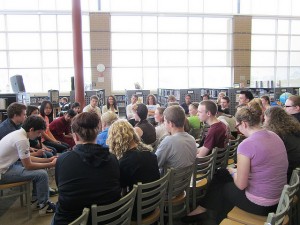Find someone who – a great first day activity!
Back to Class Special – Macmillan
Ceri posted a link to three great webinars to help us get ready for the start of term. Each is about 45 minutes long, so you can skip ahead to the one you’re most interested in, or watch all three!
First up, Sam McCarter shares some tips for exam success; next Fiona Mauchline looks at motivating teenagers to use their imagination and finally Carol Read has some advice on working with young learners.
Teaching large classes
Here are some ideas for activities which work with large classes – may be of use to those of you teaching in San Felipe or La Salle.
Speaking Skills
In the last PDM, Tom, Lucy and Nat worked with small groups thinking about speaking skills with different ages. Here are the questions we discussed:
- What topics work well with this age group? Think about relevance and whether learners have the language to communicate their ideas comfortably.
- What tasks work well with this age group? Think about controlled practice, semi-controlled tasks and freer speaking activities.
- What tools can we give them to improve their interactive (or live listening) skills?
- How can we deal with different learners (more dominant, shyer, etc)?
These are the photos from Nat’s group which were discussing YLs and the notes from Lucy’s group related to teens.
Ideas for Improving Speaking with Teens
Topics:
Music /School/Friends/Personal things/Gossip/TV Shows/Free Time activities/Sport/Computer Games/Internet /Networking sites/Fashion
Types of Activity/Tasks that work well with Teens:
Chris Roland’s Curriculum Questions which Carmen said she’d been using. Different questions on different topics using Stem sentences which students then finish off.
Zombie Apocalypse
Survival Games – one person out of a hot air balloon/ Desert Island uses for everyday objects using Infinitive of Purpose.
Onion Ring/Speed dating/Circle
Mingles
Debates
Pair work
Team work/Competitive Games
Role Plays
Board Games – Dice
Taboo – describe without saying certain taboo words.
Hot spot (1 student with back facing board) – Class describe words on the board for student to guess.
‘Say the line in the style of …’ – students say a given sentence using a tone /style of voice having been given an adverb
Running dictation /Dictation races
‘Talk for a minute’ on a given topic – To encourage spontaneous speech. ‘Whose line is it anyway’ – no repetition/hesitation or deviation allowed.
Describe a picture – everyone say one thing about a picture, no repetition allowed. (PET part 3 style)
Any activity that they can ‘sabotage or lie about’ e.g finishing off Stem sentences.
Tools to improve their interactive skills (live listening)
Role plays
‘Include a line/word/phrase’ – for points .e.g say ‘oh really’ as many times as they can naturally in a dialogue.
Question tags – did he? /were you? Etc
Different types of Learner:
Role plays – shyer pupils can hide behind a role. Dominant can fully express themselves.
Visual prompts – pictures/stem sentences
Give a line/word/phrase – students have to fit it into to a dialogue without others guessing what it is.
Pair work. Combinations of pairs . e.g. Shy+Shy/Dominant+ Dominant. Or Shy + Dominant
Onion ring/Speed dating/ Mingles – where pairs change and whole class isn’t listening to just one person.
Timed interaction – allowed 20 seconds to talk. If students go under or over time they lose points.
Chris Roland’s Curriculum Questions
In Friday’s PDM, Carmen mentioned Chris’ Curriculum Questions – three documents containing up to 300 questions on twenty different, everyday topics.
You can download them below and it’s also well worth checking out Chris’ site where you can find lots of great resources and links to the sessions which he’s presented around Spain and Portugal. You can also get ideas from our teachers who have seen him in action at ACEIA and remember that he’s coming to TEFL del Sur on Saturday 7th May this year!
Add in the comments below how you’ve been using the questions…
Cambridge Speaking Exam Tweaks
This is one of my favourite which would be good to use as well with my PET group who never listen to each other!
4. Speaking interrupted
What?
This works best with Part 2 of the speaking exam. Distribute one set of exam photos per student. Students sit in a circle. One person starts doing the task as they normally would. You stop them at any given point and signal to the person sitting next to the first speaker to pick up where the other had left off. Stop each student and appoint the next speaker randomly. Works best with smaller groups.
Why?
Students don’t usually pay attention to each other as everybody is focused on their own performance. This fast-paced activity keeps students on their toes, forces them to listen to each other and produce coherent utterances in the same vein with what their predecessors had said.
Teens abandoning social networks
Ceri posted a link to this article about the ways in which teens use social media is changing. It includes some data about what differnt social media sites people use and how, as well as talking about the reasons they are using them less.
The 5-second Rule
Simon P shared this video from the Cult of Pedagogy with an easy tip for dealing with talkative classes.
EFL and Minecraft
If any of your groups are Minecraft-mad, JG’s come across this article with some great ideas on how you can incorporate their love of the game into your lessons.
Writing in the Communicative Classroom
Simon and Amy ran a great session on working on writing in our last PDM. You can download the powerpoint presentation, which includes ideas on working with different groups, from the PDM sessions page.
They also provided some great links for follow-up reading, as well as the bibliography which is on the powerpoint.
You can check out Ceri’s video on Micro-writing for the British Council here. And in a post on her blog, close up, she has also included the slides from the talk along with some further links.
You might like to try padlet or Today’s Meet as well to get your classes writing interactively.
Simon P found this article which talks about the process of writing.




